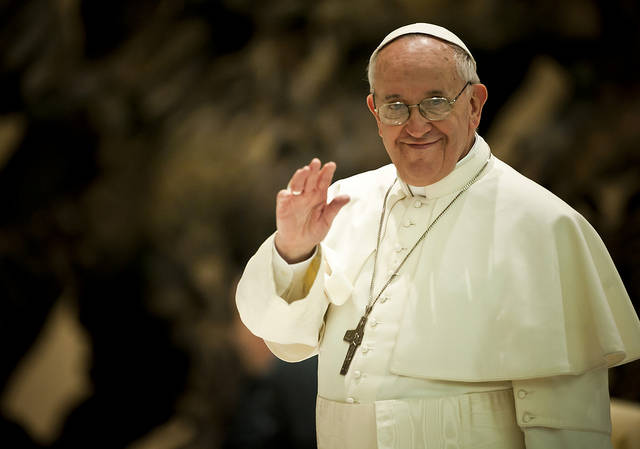Pope Francis Appeals for World Peace in Assisi
Pope Francis returns to Assisi, his birth town and home of his namesake—the 12th century friar Saint Francis, for the closing of the interreligious World Day of Prayer for Peace. The theme of the three-day event, organized by the Sant’Edigo Community, is “Thirst for Peace. Religions and Cultures in Dialogue.”
On the 30th anniversary of this international meeting, which Pope Saint John Paul II convened in 1986, Pope Francis arrived by helicopter and was welcomed by Bishop Domenico Sorrentino of Assisi.
Throughout the day he met with religious leaders of different faiths, including Christianity, Judaism, Islam, Hinduism, and Buddhism. He spoke individually with Ecumenical Patriarch Bartholomew I; Archbishop Justin Welby, head of the Anglican church; and Patriarch Aphrem II from the Syriac Orthodox Church.
He then dined with them at the Franciscan convent, along with 12 refugees from Eritrea, Mali, Nigeria, and Syria, who all illustrate the tangible impacts of war and conflict.
Before moving to St. Francis Square for the closing ceremony, Christians, including the Pope, prayed for peace at the Basilica, while those from other religions prayed elsewhere in Assisi.
In alphabetical order, countries raged by violence were read aloud with a tall candle lit for each. Participants then signed an appeal to world leaders for peace, asking to eliminate all motives of war.
In his appeal, Pope Francis says that we are “to oppose every form of violence and abuse of religion which seeks to justify war and terrorism.” He later adds, “War in the name of religion becomes a war against religion itself.”
He recognizes that “people do not always understand that war harms the world, leaving in its wake a legacy of sorrows and hate.” He continues, “In war, everyone loses, including the victors.”
In order to bring an end to war, he believes there are necessary steps to be taken: “We need a greater commitment to eradicating the underlying causes of conflicts: poverty, injustice and inequality, the exploitation of and contempt for human life.”
He closes by saying, “Nothing is impossible if we turn to God in prayer. Everyone can be an artisan of peace.”






































i-Italy
Facebook
Google+
This work may not be reproduced, in whole or in part, without prior written permission.
Questo lavoro non può essere riprodotto, in tutto o in parte, senza permesso scritto.